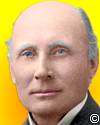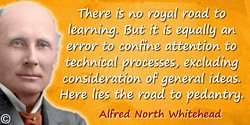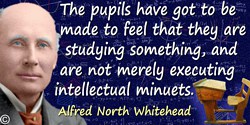 (source)
(source)
|
Alfred North Whitehead
(15 Feb 1861 - 30 Dec 1947)
English mathematician and philosopher who worked in logic, physics, and later in his life spent more time on the philosophy of science and metaphysics. He worked with Bertrand Russell on Principia Mathematica which shows that logic underlies all mathematics.
|
Alfred North Whitehead Quotes on Literature (5 quotes)
>> Click for 138 Science Quotes by Alfred North Whitehead
>> Click for Alfred North Whitehead Quotes on | Application | Civilization | Discovery | Education | Error | Fact | Idea | Imagination | Importance | Invention | Knowledge | Learning | Life | Logic | Mathematics | Mind | Particular | Philosophy | Progress | Science | Thought | Truth |
>> Click for 138 Science Quotes by Alfred North Whitehead
>> Click for Alfred North Whitehead Quotes on | Application | Civilization | Discovery | Education | Error | Fact | Idea | Imagination | Importance | Invention | Knowledge | Learning | Life | Logic | Mathematics | Mind | Particular | Philosophy | Progress | Science | Thought | Truth |
The function of Latin literature is its expression of Rome. When to England and France your imagination can add Rome in the background, you have laid firm the foundations of culture. The understanding of Rome leads back to the Mediterranean civilisation of which Rome was the last phase, and it automatically exhibits the geography of Europe, and the functions of seas and rivers and mountains and plains. The merit of this study in the education of youth is its concreteness, its inspiration to action, and the uniform greatness of persons, in their characters and their staging. Their aims were great, their virtues were great, and their vices were great. They had the saving merit of sinning with cart ropes.
— Alfred North Whitehead
In 'The Place of Classics in Education', The Aims of Education: & Other Essays (1917), 106.
The ideal of mathematics should be to erect a calculus to facilitate reasoning in connection with every province of thought, or of external experience, in which the succession of thoughts, or of events can be definitely ascertained and precisely stated. So that all serious thought which is not philosophy, or inductive reasoning, or imaginative literature, shall be mathematics developed by means of a calculus.
— Alfred North Whitehead
In Universal Algebra (1898), Preface.
The sense for style … is an aesthetic sense, based on admiration for the direct attainment of a foreseen end, simply and without waste. Style in art, style in literature, style in science, style in logic, style in practical execution have fundamentally the same aesthetic qualities, namely, attainment and restraint. The love of a subject in itself and for itself, where it is not the sleepy pleasure of pacing a mental quarter-deck, is the love of style as manifested in that study. Here we are brought back to the position from which we started, the utility of education. Style, in its finest sense, is the last acquirement of the educated mind; it is also the most useful. It pervades the whole being. The administrator with a sense for style hates waste; the engineer with a sense for style economises his material; the artisan with a sense for style prefers good work. Style is the ultimate morality of the mind.
— Alfred North Whitehead
In 'The Aims of Education', The Aims of Education and Other Essays (1929), 23.
There is only one subject matter for education, and that is Life in all its manifestations. Instead of this single unity, we offer children—Algebra, from which nothing follows; Geometry, from which nothing follows; Science, from which nothing follows; History, from which nothing follows; a Couple of Languages, never mastered; and lastly, most dreary of all, Literature, represented by plays of Shakespeare, with philological notes and short analyses of plot and character to be in substance committed to memory.
— Alfred North Whitehead
In 'The Aims of Education', The Aims of Education: & Other Essays (1917), 10.
Very little of Roman literature will find its way into the kingdom of heaven, when the events of this world will have lost their importance. The languages of heaven will be Chinese, Greek, French, German, Italian, and English, and the blessed Saints will dwell with delight on these golden expressions of eternal life. They will be wearied with the moral fervour of Hebrew literature in its battle with a vanished evil, and with Roman authors who have mistaken the Forum for the footstool of the living God.
— Alfred North Whitehead
In 'The Place of Classics in Education', The Aims of Education: & Other Essays (1917), 104.
See also:
- 15 Feb - short biography, births, deaths and events on date of Whitehead's birth.
- Science and the Modern World, by Alfred North Whitehead. - book suggestion.




 In science it often happens that scientists say, 'You know that's a really good argument; my position is mistaken,' and then they would actually change their minds and you never hear that old view from them again. They really do it. It doesn't happen as often as it should, because scientists are human and change is sometimes painful. But it happens every day. I cannot recall the last time something like that happened in politics or religion.
(1987) --
In science it often happens that scientists say, 'You know that's a really good argument; my position is mistaken,' and then they would actually change their minds and you never hear that old view from them again. They really do it. It doesn't happen as often as it should, because scientists are human and change is sometimes painful. But it happens every day. I cannot recall the last time something like that happened in politics or religion.
(1987) -- 


